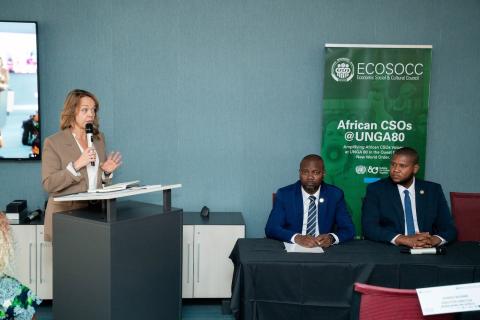On 20th September 2025, the African Union’s Economic, Social and Cultural Council (ECOSOCC) and Cambridge University Press & Assessment (Cambridge) signed an agreement to work together on education initiatives that will help shape the future of teaching and learning across Africa.
The agreement was signed in New York on the sidelines of the just concluded 80th United Nations General Assembly.
Africa has the world’s fastest growing youth population, with 60% of its people under the age of 25 today. By 2050, one in four people on earth will live on the continent. This demographic shift presents both immense opportunities and pressing challenges: education systems must evolve rapidly to prepare young Africans with the skills needed for work, life, and leadership in a transforming world.
In this context, ECOSOCC plays a critical role ensuring citizens’ perspectives shape continental policies and programs.
ECOSOCC Presiding Officer Louis Cheick Sissoko said, “This partnership is a vital step towards strengthening the relationship between ECOSOCC and Cambridge. It aims to amplify the voices of African citizens and support the African Union’s agenda, contributing to sustainable development and educational transformation across the continent.”
Dr. Anna Kingsley of Cambridge added, “True partnership is essential. We often learn as much from our partners as they do from us. Together, we will ensure sustainable impact.”
ECOSOCC Head of Secretariat William Carew signed on behalf of ECOSOCC.
Managing Director of the Partnership for Education and Director of Education in International Education at Cambrige, Jane Mann, signed on behalf of Cambridge.
This MoU marks a pivotal step towards building resilient, future-focused education systems for Africa.
Through this agreement, ECOSOCC and Cambridge will develop a joint action plan covering four key areas:
- Digital education tools and learning systems. The partnership will explore ways to integrate digital technologies into teaching, learning and assessment to improve access, flexibility and quality. This includes developing online and offline courses, interactive platforms, and using tools such as tablets and educational software to support both teachers and learners.
- Curriculum innovation. ECOSOCC and Cambridge will explore new approaches to curriculum design and training that equip young Africans with the skills they need for employment, entrepreneurship and life.
- Capacity development for African civil society. As part of this effort, ECOSOCC and Cambridge will also work to strengthen the capacity of African civil society in areas such as leadership, governance and sustainability. This will pave the way for lasting change.
- Strategic partnerships with multiple stakeholders. ECOSOCC and Cambridge will explore opportunities to come together with other partners and make the most of existing resources. This may include aligning projects, sharing expertise and finding practical ways to achieve common goals that benefit students and communities across Africa.






